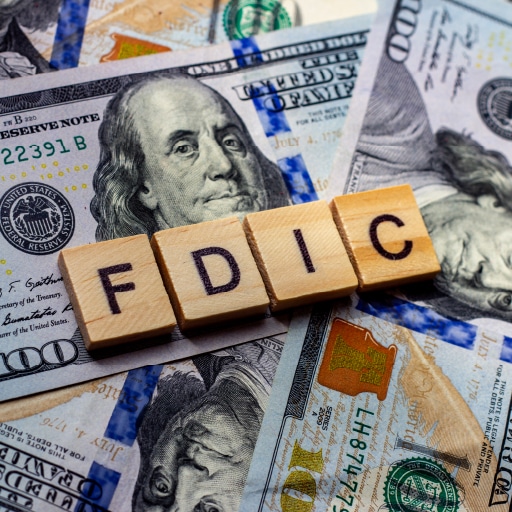
The Federal Deposit Insurance Corporation [FDIC] was created in the wake of the Great Depression to rebuild trust in the American banking system. Since that time, the FDIC has played a pivotal role in protecting deposits from bank failure.
Currently, FDIC insurance covers $250,000 per account ownership category at each insured bank – regardless of whether the owner is an individual or a business. Unfortunately, many businesses carry more than this level of cash.
The FDIC insures individual deposits and business deposits against bank failure.
According to the FDIC, “no depositor has ever lost a penny of insured deposits since the FDIC was created in 1933.” This statement applies to both individual depositors and businesses, since both are afforded equal protection by the agency.
The FDIC protects deposits by charging insured banks a premium and depositing those fees into an insurance fund. In the event of a bank failure, the FDIC uses the assets in this fund to guarantee deposits up to applicable limits. They will then auction the assets and liabilities of the failed bank to recover funds – often with extra financial incentives.
If a resolution cannot be fully met with an auction, the FDIC will reimburse all insured deposits directly from the insurance fund. In the past, people have floated rumors that the FDIC takes up to 99 years to make such payouts. However, this is incorrect. The FDIC states that its goal is to “make deposit insurance payments within two business days of the failure of the insured institution.”
FDIC Coverage Limits
The amount of FDIC protection available at each member bank is limited to $250k per account ownership category – not to be confused with account type. An ownership category could be an individual account, a joint account, or even a business account, while an account type is typically ‘checking’ or ‘savings.’ This means an owner can have multiple types of accounts at each bank, but only a total of $250k would be covered for each ownership category.
What types of accounts are covered?
FDIC coverage can span many types of deposits, such as checking and savings accounts, money market accounts, Certificates of Deposit [CDs], and more. However, the FDIC does not cover investments such as stocks, bonds, mutual funds, life insurance, or annuities.
FDIC insurance treats business accounts the same as personal accounts.
Bank accounts for corporations, partnerships, and unincorporated associations get the full $250k in FDIC coverage, separate from any owner or member of the organization. However, such businesses must be “separately organized under state law and operate primarily for some purpose other than to increase deposit insurance coverage.” In other words, a company cannot be formed solely for the purpose of extending an individual or business’s FDIC coverage.
Is it possible for a business to achieve more than $250k in FDIC coverage?
Yes. A business can extend FDIC insurance by spreading deposits across multiple FDIC insured banks. For example, a company with $400,000 in a single savings account leaves $150,000 uninsured. On the other hand, splitting those deposits equally between two banks results in two accounts with $200,000 each – both of which would be fully insured.
Organizations with cash reserves significantly above the $250k limit can find it tedious and expensive to manage the number of banking relationships required to achieve full FDIC coverage. Fortunately for business, we’ve changed the game for those who need FDIC coverage for large sums of cash.
With ADM, Businesses Get Access to Extended Protection and Nationally Competitive Returns for Cash Reserves
At The American Deposit Management Co. [ADM], we have leveraged proprietary fintech to create unique cash management solutions that provide access to extended deposit protection. Our technology allows us to spread business cash across our national network of financial institutions, so each account is under the applicable government limit and fully insured by the FDIC or NCUA.
In addition to full government protection, our solutions provide access to nationally competitive returns because the financial institutions in our network compete for deposits. Best of all, we make reconciliations simple with a single account, consolidated monthly statement, and user-friendly online portal.
To learn more or get started, contact a member of the ADM team. All it takes is a simple application, and within a few hours you can make your first deposit. Then, we take it from there.
In the meantime, be sure to subscribe to our mailing list and follow us on LinkedIn, Twitter and Facebook to stay up to date with our valuable market insights.
*American Deposit Management Co. is not an FDIC/NCUA-insured institution. FDIC/NCUA deposit coverage only protects against the failure of an FDIC/NCUA-insured depository institution.
